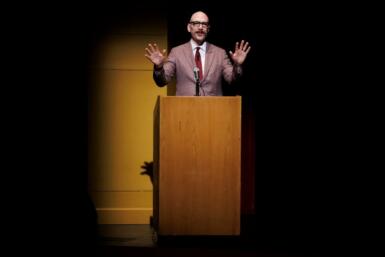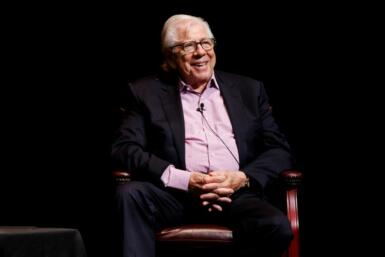Pulitzer Prize-winning journalist Bernstein discusses challenges today’s journalists face

Fifty years after Richard Nixon’s resignation, Carl Bernstein is still telling the same story.
“We could never have imagined another criminal president of the United States,” the Pulitzer Prize winner who broke the Watergate scandal with partner Bob Woodward told an audience at the Buskirk-Chumley Theater on Thursday, one week after former president Donald Trump’s 34-count felony conviction.
Bernstein keynoted IU’s Granfalloon Festival, an annual festival of arts, music, and scholarship inspired by Hoosier author Kurt Vonnegut. The connection between the two writers is Vonnegut’s novel “Jailbird,” which is narrated by a fictional character who helped carry out the Watergate crimes.

In a conversation moderated by Media School Dean David Tolchinsky, Bernstein reflected on the relevance of Watergate to Trump’s charges and convictions, as well as the challenges today’s journalists face in reporting “the best obtainable version of the truth.”
Some of those challenges — for example, profit losses caused by the digitization of media — are contemporary. But he said some, such as the characterization of journalists as the “enemy of the people,” are longstanding struggles.
Nixon’s White House tapes — subpoenaed as part of the Watergate investigation — contained a conversation in which the president told Henry Kissinger, his national security advisor: “Never forget: The press is the enemy. The press is the enemy. The press is the enemy.”
“There’s nothing new about calling the press the enemy of the people,” Bernstein said.
But what is new is a lack of a shared reality and a consensus on what “truth” is. The digitization of media has revoked the traditional curatorial role of the press, he said, allowing the public to only seek out information that reinforces what they already believe. Algorithms actively incentivize the dissemination of disinformation.

“We’ve never been confronted with a media ecosystem in which most people — not just in this country — are imbibing and chewing information that has no basis in the truth,” Bernstein said.
But this polarization has decades-old roots, he said, referring to a “cold civil war” that simmered for 30 to 40 years until Trump ignited it.
Despite the industry’s financial struggles, Bernstein said there’s a lot of quality journalism being produced right now, citing organizations including Pro Publica and the Texas Tribune. The collective reporting of the Trump presidency was “probably the greatest reporting of the presidency by the most reporters that I’ve seen in my lifetime,” he said.
The journalism the country is lacking, though, is a deeper look into the cultural shift the U.S. has seen since Watergate — the root of that “cold civil war.”
“That’s the kind of journalism we’ve been weak on,” he said. “We really can lose definitively what has been built in this country.”

